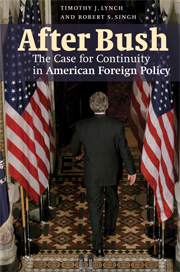Book contents
- Frontmatter
- Contents
- List of figures
- Acknowledgements
- Introduction: Winning the Second Cold War
- Chapter 1 Bush and the American foreign policy tradition
- Chapter 2 The constitution of American national security
- Chapter 3 The Second Cold War on Islamist terror: negative audits
- Chapter 4 The Second Cold War on Islamist terror: a positive audit
- Chapter 5 Iraq: Vietnam in the sand?
- Chapter 6 The Middle East: reformation or Armageddon
- Chapter 7 Frineds and foes after Bush
- Chapter 8 The emerging consensus at home and aborad
- Conclusion: The case for contiuity
- Notes
- Bibliography
- Index
Chapter 2 - The constitution of American national security
Published online by Cambridge University Press: 22 September 2009
- Frontmatter
- Contents
- List of figures
- Acknowledgements
- Introduction: Winning the Second Cold War
- Chapter 1 Bush and the American foreign policy tradition
- Chapter 2 The constitution of American national security
- Chapter 3 The Second Cold War on Islamist terror: negative audits
- Chapter 4 The Second Cold War on Islamist terror: a positive audit
- Chapter 5 Iraq: Vietnam in the sand?
- Chapter 6 The Middle East: reformation or Armageddon
- Chapter 7 Frineds and foes after Bush
- Chapter 8 The emerging consensus at home and aborad
- Conclusion: The case for contiuity
- Notes
- Bibliography
- Index
Summary
A feeble executive is but another phrase for a bad execution … whatever it may be in theory, must be, in practice, a bad government.
Alexander Hamilton, Federalist 70The next thing I knew, the discussion was onto the subject of fascism in America. Everybody was talking about police repression and the anxiety and paranoia as good folks waited for the knock on the door and the descent of the knout on the nape of the neck. I couldn't make any sense out of it … one of the great unexplained phenomena of modern astronomy: namely, that the dark night of fascism is always descending in the United States and yet lands only in Europe.
Tom WolfeTo its critics, the Bush administration post-9/11 responses were anything but carefully calibrated or constitutionally sound. The charge list is invariably a long one: from warrantless wiretapping and the monitoring of international banking transactions by the National Security Agency, through military tribunals, the use of presidential ‘signing statements’ and the invocation of executive privilege at home to instances of prisoner abuse, coercive interrogation and extraordinary renditions abroad, the administration strained not only every sinew to wage its war on terror but also stretched the meaning of the US Constitution to breaking point. If America had finally revealed its imperial pretensions after September 11, then the president had likewise emerged as a more imperial figure in his studied neglect of constitutional convention and barely concealed contempt for international law.
- Type
- Chapter
- Information
- After BushThe Case for Continuity in American Foreign Policy, pp. 46 - 83Publisher: Cambridge University PressPrint publication year: 2008



